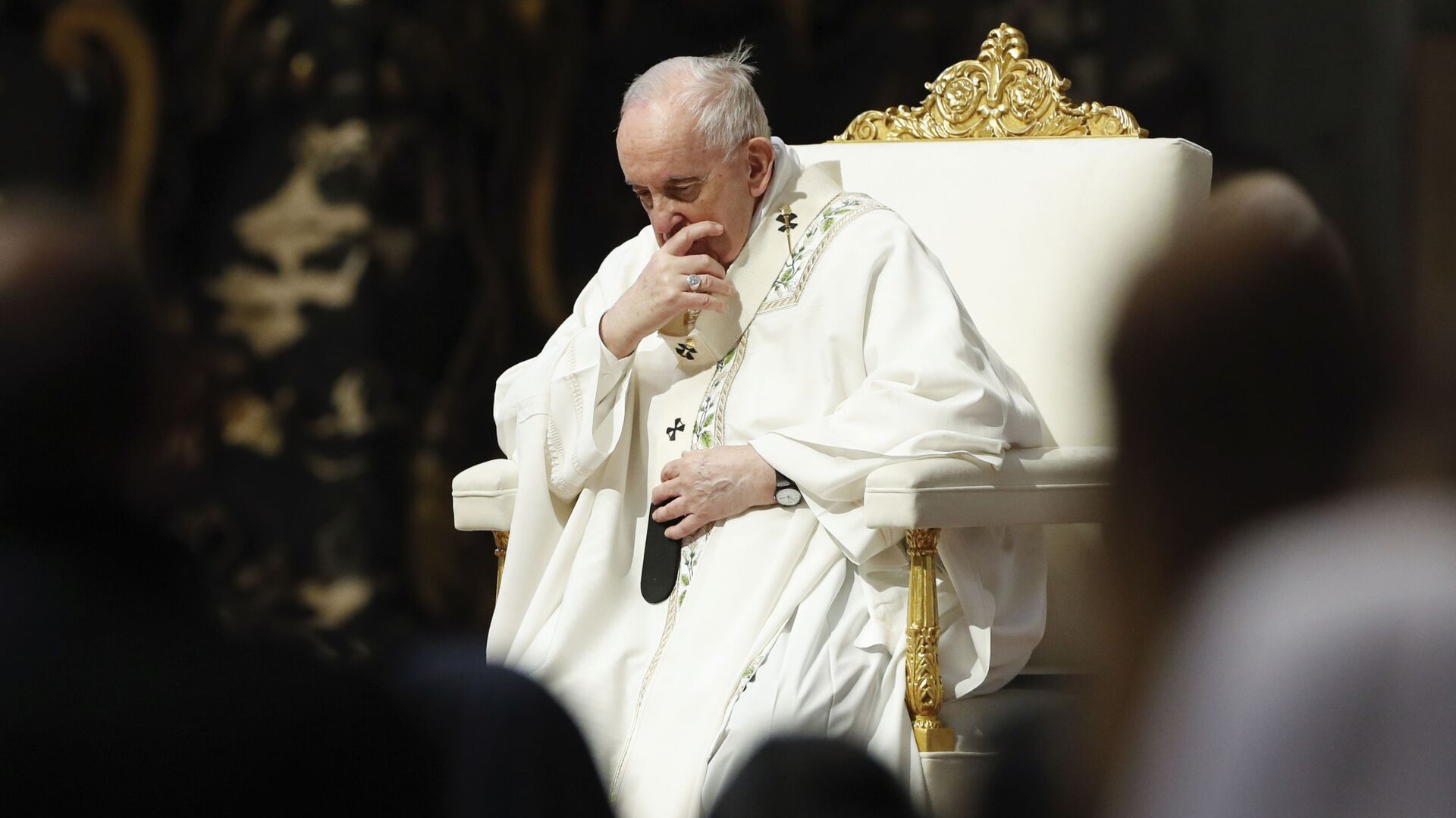Pope Francis Apologizes to Indigenous Delegates for Abuses at Canadian Residential Schools

© AP Photo / Remo Casilli
Subscribe
The apology comes after Pope Francis initially expressed “sorrow” when last year over 1,000 unmarked graves belonging to the bodies of indigenous children, and some adults, were discovered at the sites of former church-run residential schools, designed to assimilate and Christianize indigenous children through cultural genocide.
Pope Francis formally apologized on Friday for the “deplorable conduct” of those who ran the Catholic schools in Canada. While the Canadian Prime Minister Justin Trudeau apologized for the stolen lives of the Canadian Ingenious peoples in June of last year, the pope was not as quick to take action.
A series of meetings were held earlier this week in the Vatican during which Indigenous leaders from the First Nations, Metis and Inuit communities, as well as survivors of the residential schools requested an apology from the pope for the role the Catholic Church played in what Canada’s Truth and Reconciliation Commission have referred to as the culture genocide of their peoples.
The pope acknowledged the loss of identity through what he calls “ideological colonization,” as well as the breaking of the indigenous peoples’ connection to the land by a “colonization that lacked respect for you,” adding “in this way great harm was done to your identity and your culture.”
“Many families were separated, and a great number of children fell victim to these attempts to impose a uniformity based on the notion that progress occurs through ideological colonization following programs devised in offices rather than the desire to respect the life of peoples,” Pope Francis said in his apology on Friday.
"It is chilling to think of determined efforts to instill a sense of inferiority, to rob people of their cultural identity, to sever their roots, and to consider all the personal and social effects that this continues to entail: unresolved traumas that have become intergenerational traumas."
"All these things are contrary to the Gospel of Jesus Christ. For the deplorable conduct of those members of the Catholic Church, I ask for God's forgiveness and I want to say to you with all my heart: I am very sorry. And I join my brothers, the Canadian bishops, in asking your pardon,” the pope said.
This is not the first time Pope Francis has made a reference to what he calls “ideological colonization.” According to Prof. Massimo Faggioli of Villanova University, the pope has been working on this idea of “ideological colonization” for many years now. Faggioli says the pope believes that Catholics are a part of the “historical problem” of cultural genocide, but that the pope hopes Catholics can also be part of the solution. In 2019, Pope Francis met with bishops during what is known as a “synod” in an effort to address environmental issues, such as climate change, plaguing the Amazon region and its rainforest.
Natan Obed, a Canadian politician and president of the Inuit Tapiriit Kanatami (ITK) remarked that the pope’s apology on Friday was “long overdue,” but that he was touched by the Pope’s expression of sorrow. "Today we have a piece of the puzzle," Obed said. "We have a heartfelt expression from the church that was delivered by Pope Francis in an empathetic and caring way."
“In Pope Francis’s statement today, I see that we were heard. I hear that we were heard,” Cassidy Caron, the Metis National Council President, told reporters. “This week has truly shown that there is power in our stories and there is power in our truths.”
“So many people have said in the past that they can’t begin the healing process that would lead to true reconciliation without hearing the pope say, ‘I’m sorry,’” said Phil Fontaine, a former national chief of the Assembly of First Nations who suffered abuse in Canada’s residential schools. “We’re witness to that moment today, and I sincerely believe that people now have an opportunity… to forgive. But forgiveness is just as difficult as to apologize.”
From the 1880s well until 1996, more than 150,000 Indigenous children were forced into residential schools, 60 percent of which were run by the Catholic Church. Indigenous children were taken from their homes, sometimes by force, and housed in overcrowded boarding schools which destroyed their language and culture in an effort to Christianize the children.
While the traumatizing history of these schools were well known to the Indigenous community, they were often met with skepticism every time they argued that their children had disappeared in these schools, until just May last year, when they discovered the remains of 215 children, some as young as three years old, on the grounds of a former residential school through the use of ground-penetrating radar.
After their discovery in May, they found more unmarked graves, this time in June belonging to at least 751 Indigenous people. A National Truth and Reconciliation Commission created by the Canadian government to address the cultural genocide of the indigenous peoples in these schools concluded that at least 4,100 children died while attending these schools from mistreatment, neglect, disease or accident. In many cases, the parents of these “missing children” were not informed as to what had happened to their child.
“It’s a harsh reality and it’s our truth, it’s our history,” Chief Casimir said at a news conference. “And it’s something that we’ve always had to fight to prove. To me, it’s always been a horrible, horrible history.”
